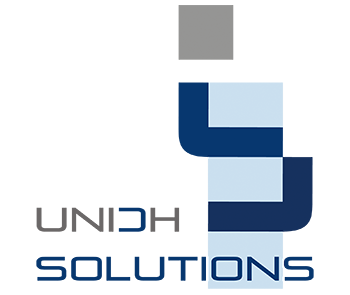Innovative Digital Strategies
The Vision ...
for each individual company is to recognize the potentials of digitalization and to use them in a targeted manner, with the goal of making companies fit for the future and ready for the new challenges and opportunities of the digital age.
In doing so, we not only support our clients in the introduction of new digital technologies and services (e.g., HPC, AI, QC, Big Data), we also help, for example, in the creation of a digital corporate culture and the development of new digital business models.

We use our many years of expertise and experience to support innovative digital strategies with the appropriate technologies.
A path full of opportunities and possibilities
Unich Solutions advises and supports companies and organizations in the implementation and use of digital technologies and helps to use digital data efficiently to improve or redesign business models, ways of working, products, and services. Our consulting focus areas in the following:
- technology integration: digital transformation involves the introduction and integration of technologies such as cloud computing, artificial intelligence (AI), Big Data analytics, supercomputing and quantum computing, the Internet of Things (IoT) and blockchain into business operations.
- data management: organizations collect and analyze large amounts of data to gain better insights into their customers, processes, and markets. Data analytics and business intelligence are crucial tools in this context.
- automation: automation technologies, including RPA (Robotic Process Automation) and AI, are used to automate repetitive tasks and processes, increasing efficiency, and freeing up human resources for more demanding tasks.
- customer orientation: companies use digital channels to maintain closer contact with their customers and offer personalized experiences. This can be achieved through social media, mobile apps, e-commerce platforms and CRM systems.
- agility and flexibility: Digital transformation enables companies to respond quickly to changes in their markets and business environment. Agile methods in software development and DevOps are examples of approaches that support this.
- innovation: Digital transformation enables companies to develop new business models and introduce innovative products and services. Start-ups use digital technologies to gain a foothold in established industries.
- cybersecurity: with increasing digitalization, companies need to pay more attention to the security of their digital infrastructure to prevent data breaches and other security problems.
- cultural change: digital transformation often requires a profound cultural change in an organization to promote the acceptance of new technologies and ways of working.
There is no one way!
A sustainable and value-creating Digital Transformation needs clever and innovative digital strategies, which our consultants will propose to the respective company after comprehensive analyses and consultations.
If the digital transformation starts with the digitization of processes and recurring workflows, it is often accompanied by a far-reaching redesign of working practices to achieve efficiency gains from the outset through refined communication and shared data management. Sustainable improvements manifest themselves in the continuous generation of additional information sources, for example, to represent an entire value chain as precisely as possible as a digital twin. This not only requires advanced solutions at the hardware and software level, but also leads to more evidence-based decision-making using artificial intelligence (AI), for example.

Wir begleiten SIE von der Entwicklung einer klaren Vision und umsetzbaren Strategie bis zur kontinuierlichen Verbesserung, um eine erfolgreiche digitale Transformationen möglich zu machen.
The development of the digital compass
- develop a clear vision and strategy: Let’s define your long-term vision for digital transformation together. What goals do you want to achieve? Define a strategy for how you want to collect data, analyze it, and use AI to achieve these goals.
- Capture and store data: Let us identify the relevant data sources in your company, both internal and external. Make sure the data is high quality, relevant, and legally sound. Consider using databases, data warehouses or cloud storage solutions.
- ensure data quality: Data must be clean, consistent, and reliable. Put data collection, cleansing, and processing mechanisms in place to ensure that your data is of high quality.
- analysis and insight generation: Use data analytics tools to gain insights and insights from your data. Let’s use techniques like data mining, statistical analysis, and machine learning to identify patterns and trends.
- evidence-based decision making: Use the insights gained from analyzing their data to inform decisions. This helps to replace subjective assumptions with sound evidence and minimize risks.
- development of AI solutions: Use cases for AI are identified that help optimize business processes. These could be chatbots, predictive models, automation solutions, etc.
- modeling and training of AI models: Relevant data for the desired AI use case is collected and used to train models. The more high-quality data available, the higher the quality of the model.
- implementation and integration: Developed AI models are integrated into business processes. Seamless integration is a condition for the models to work effectively.
- monitoring and optimization: continuously monitoring the performance of the AI solutions, optimizing the models to achieve better results, and adapting the solutions to changing requirements.
- Promote a culture of change: Successful digital transformation often requires a change in corporate culture. Promoting acceptance of data analytics and AI throughout the organization is necessary. It is supported by offering training and sufficient communication.
- consider security and data protection: Observing data protection guidelines and security precautions at every stage of the transformation is necessary to prevent data loss or misuse and thus not betray trust.
- continuous improvement: Digital transformation is an ongoing process. Together, we learn from successes and failures, adjust the strategy, and thus remain flexible to adapt to changing technologies and business requirements.
Digital meets Service
The digitization of products and services is leading to a service-focused approach. Service is already constantly present in daily life. However, the service experience often fails to meet expectations because it is strongly influenced by individual circumstances. Based on empirical values, the essential aspects in the development and implementation of service in the corporate context are listed below:
- user-centeredness: the user experience has top priority. The needs, expectations and challenges of the target group must be carefully analyzed and considered. Continuous feedback and usability testing are essential and will continuously expand the user experience.
- clear objectives: what results should the service achieve? What problems should it solve? Questions that help keep development on track and measure success. Together, we define clear goals for your digital service.
- security and privacy: data and privacy are a top priority. We focus on ensuring that appropriate security measures are implemented to protect privacy, comply with all data protection regulations, and thus maintain trust in your company.
- scalability and flexibility: Excellent digital service can keep pace with increasing user numbers and changing requirements. A scalable and flexible architecture is therefore crucial.
- technology selection: We support you in finding the appropriate technologies and platforms that meet your goals and requirements. Future developments and trends are also considered.
- quality control and testing: to guarantee that the service is reliable and error-free, thorough testing and quality assurance are essential.
- maintenance and updates: Regular updates and maintenance of the service components is essential to keep functionality up to date and to close security gaps.
In addition, other key factors need to be considered in service development, as customer-supplier interactions in many respects form the basis for in-depth analysis and only then open further opportunities. We help achieve your potential for success.

Simply integrating a good idea into an app and storing it in the cloud, as well as stabilizing it through efficient processes, is not enough. Ultimately, it’s the people around it that make success possible.
Agile sales management
The Vision ...
working with our clients to create a highly adaptable and customer-focused sales organization that can respond quickly to changing market conditions and continuously deliver outstanding results. We strive to establish agility not only as a method, but as a culture in sales organizations.
New customers: The strategic asset
Agile Sales Management: Strategies for Business Success

Die enge Zusammenarbeit zwischen Marketing- und Vertriebsteams, IT-Experten sowie anderen relevanten Abteilungen innerhalb eines Unter-nehmens ist unabdingbar, um den digitalen Wandel einer Organisation erfolgreich voranzubringen.
Failure is not an option.
Unich-Solutions GmbH offers support in the establishment, expansion, realignment, or corporate transformation of an organization. Furthermore, it assists in the creation and adaptation of business strategies and actively supports companies in the development and exploitation of new business opportunities (corporate business development). In case of need and upon request, we offer interim sales management, where we provide our own highly experienced sales managers on a temporary and exclusive basis for our clients. In the case of longer-term engagements, we actively support the recruitment of sales personnel suitable for the organization (exclusive search). For this purpose, we cooperate with renowned personnel agencies. Our focus is on:
- identifying opportunities: this involves analyzing the market, identifying trends, and recognizing potential business opportunities that arise from the use of new IT technologies.
- product and service development: Companies must constantly develop new products and services to meet changing customer requirements. Our Corporate Business Development helps plan and implement these development projects.
- customer acquisition and retention: We support the acquisition of new customers and help maintain existing customer relationships.
- partnerships and cooperations: We help to find the right partnerships with other companies, be it in the form of technology partnerships, strategic alliances, or distribution agreements.
- market expansion: Unich Solutions GmbH supports expanding the business into new geographic regions or industries to maximize growth potential.
- technology evaluation: It is important to follow and evaluate the latest technology trends and developments to ensure that the company remains competitive and makes the right technology decisions. We provide advice regarding our focus areas.
IT-Contracting and Procurement Management
The Vision ...
On the one hand, to enable companies to manage an efficient, transparent, and competitive procurement of IT solutions and, on the other hand, to efficiently shape the award process in order to optimally support business objectives and achieve the best possible results for the organization.
Only money for goods is a thing of the past.
From Needs Analysis to Optimization: Consulting in the IT Contracting and Procurement Process.

Unsere langjährige Expertise und Erfahrung setzen wir ein, um die IT-Beschaffung und den dazugehörenden Vergabeprozess unserer Klienten zu unterstützen, Risiken zu minimieren und die bestmöglichen Ergebnisse zu erzielen. Wir begleiten auf Wunsch die reibungslose Umsetzung nach dem Vertragsabschluss und sichern so den Erfolg beim Einkauf.
Cheap alone is not enough.
Purchasing complex IT services and products requires a well-structured approach and should consider the following points:
- needs analysis: A comprehensive analysis of the needs is necessary to clearly work out the requirements and goals. Only through this way suitable solutions are developed.
- offer analysis: as a consultant, we compare and analyze different offers and products from suppliers or vendors to select those that best fit the needs of our clients. This can also be done neutrally in advance without naming the client.
- strategic planning: a long-term procurement strategy is developed that optimizes the purchase of services and products, minimizes costs, and ensures quality.
- negotiations: In the negotiation process with suppliers, we support to achieve the best conditions, prices as well as contract terms for the client.
- risk management: Complex products and services can involve risks. Creating a risk assessment and proposing solutions will minimize potential problems.
- contract management: when drawing up and reviewing contracts, we guarantee that all agreements are appropriate and that our client’s interests are protected.
- supplier management: the focus is on supporting the selection and management of suppliers so that they meet the client’s requirements, and a long-term partnership can be established.
- technological expertise: especially in the case of complex technological products, the expertise acquired over the long term is brought to bear to ensure that the solutions selected meet the technical requirements.
- project management: In the complex procurement processes, clients are relieved of the coordination, implementation, and monitoring of the project.
- reporting and analysis: regular reports and analysis are provided to the client on the progress of the purchasing process and recommendations for future steps.
- continuous optimization: The contribution to continuously improve the purchasing process by using the feedback is essential to refine future procurement strategies.
- smooth implementation: this is an essential part of the service after the contract is signed and ultimately ensures the success of the entire project.

